
Contents
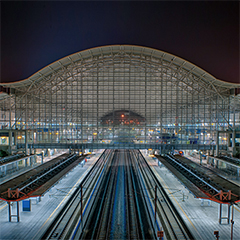
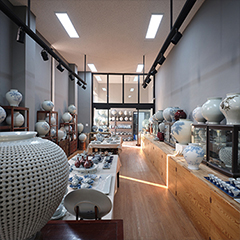
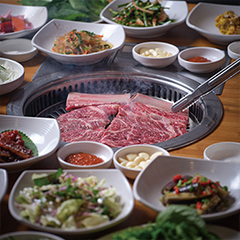
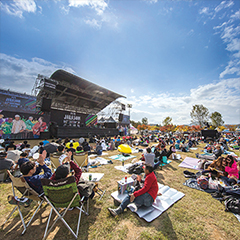

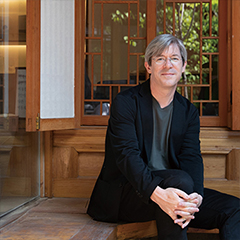
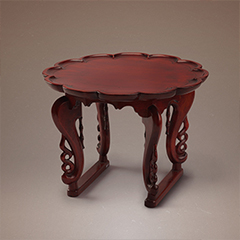
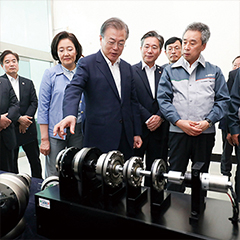


Current Korea · Written by Sohn Ji-ae
Reopening Old Wounds
With Japan imposing export curbs on and removing Korea from its whitelist of preferred trading
partners, President Moon Jae-in faces his toughest crisis with Japan. Tension between the two
nations dates back centuries with Tokyo’s trade sanctions reopening old wounds.
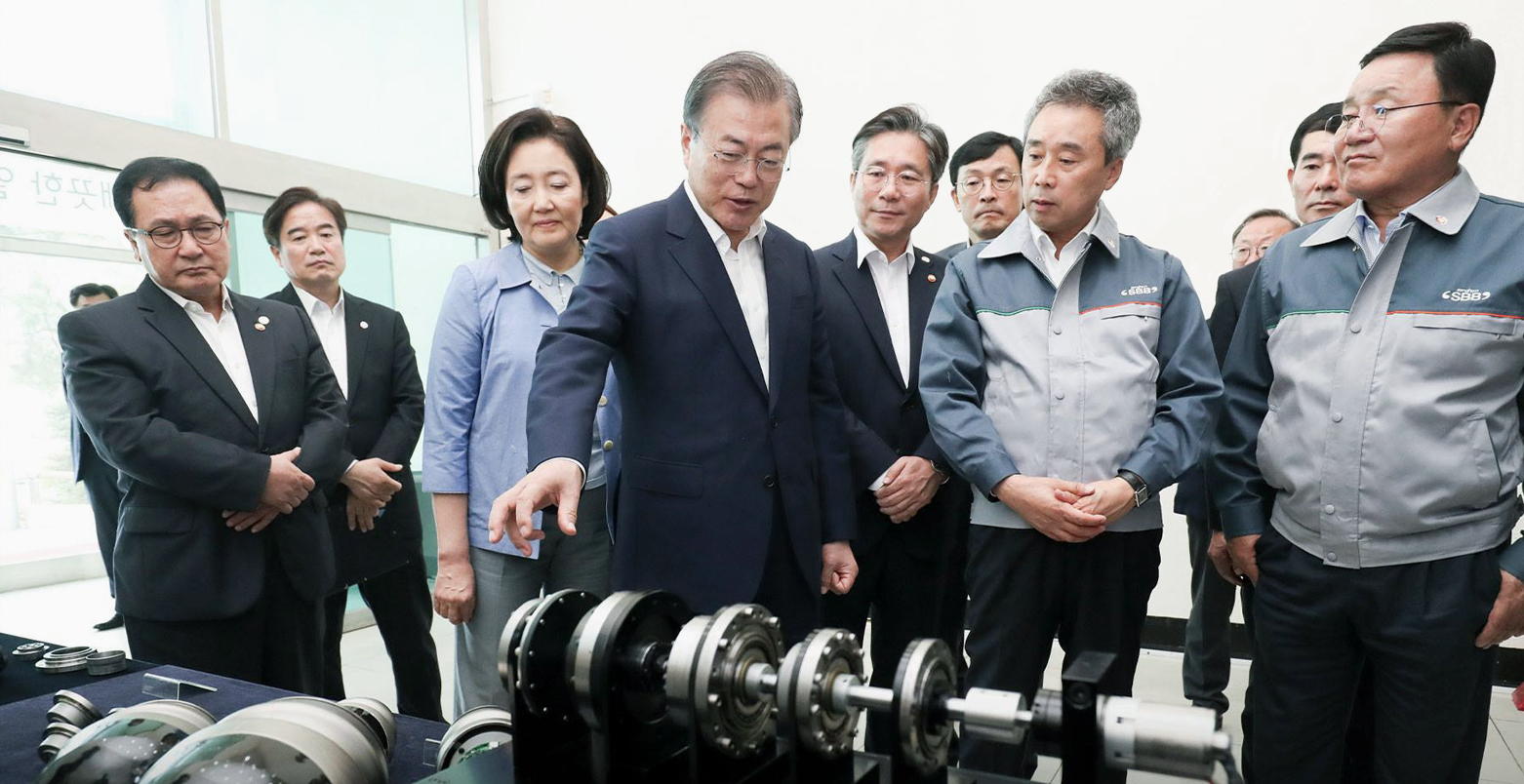
President Moon Jae-in on Aug. 7 visits in the city of Gimpo, Gyeonggi-do Province, the decelerator manufacturer SBB Tech, a visit following Japan’s recent export restrictions. © Cheong Wa Dae
Japanese goods remain unsold at stores and supermarkets in Korea. Protests show no signs of ending outside Japanese diplomatic offices in and out of Seoul. These sights have grown over the past few months since Japan started a slew of trade restrictions on Korea.
The trade spat began with the July 4 imposition of export curbs on semiconductor materials used to make chips, Korea’s top export item. Then on Aug. 4, Japan announced its decision to remove Korea from a whitelist of trusted trading partners. Tokyo’s moves have since fueled a growing boycott of Japanese goods and a high level of anti-Japanese sentiment across the nation, with public outcry growing more intense on the 74th National Liberation Day on Aug. 15.
The latest developments have dramatically raised the stakes in a political and diplomatic standoff between the two neighbors. Unsurprisingly, bilateral relations have plunged to their lowest point in decades.
Tit-for-Tat
Not one to just sit idly by, the Korean government on Aug. 12 announced that it would also drop Japan from its whitelist of 29 countries with “fast-track trade status.” The delisting will apply tighter trade regulations to Korean exports to Japan related to weapons production and machine tools.
President Moon Jae-in also pledged to turn Japan’s economic retaliation into a blessing in disguise for Korea and push ahead with a detailed strategy to achieve more qualitative economic growth.
He also tried to find a silver lining in the trade row, saying, “If the peoples of our two countries communicate with a better understanding of democratic values and human rights based on a fully mature civic awareness and deepen their amity through a spirit of peace and love for humanity, the future of Korea-Japan relations will brighten.”
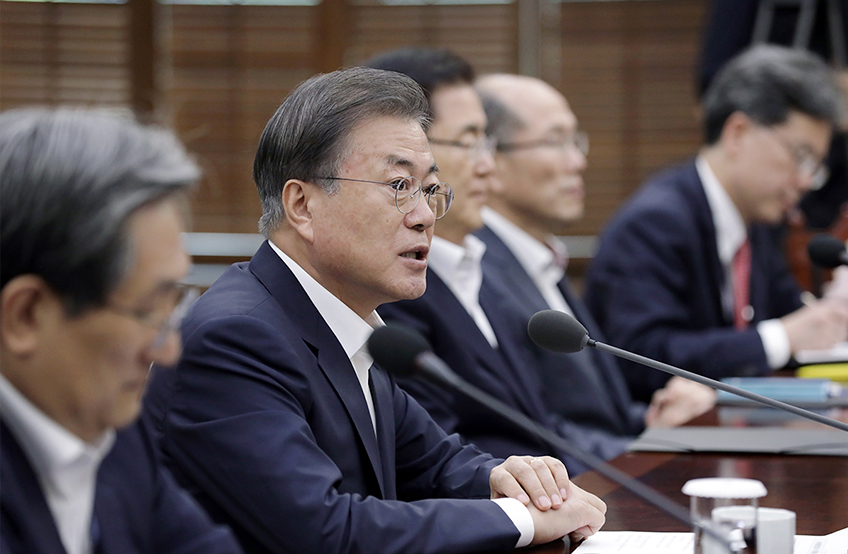
President Moon Jae-in on Aug. 12 hosts a meeting with his senior aides after the government announced its decision to drop Japan from a whitelist of preferential trading nations. © Cheong Wa Dae
Longstanding Animosity
Many experts and foreign media say this trade spat stems from Japanese atrocities committed on the Korean Peninsula before and during World War II. Both countries have had frequent diplomatic and territorial disputes related to Japan’s colonial rule of the peninsula from 1910-45.
Citing such disputes stemming from Japanese occupation as a reason for the trade rift, The New York Times on Aug. 12 said, “But bilateral relations have soured further under the current governments of Seoul and Tokyo.”
Japanese Prime Minister Shinzo Abe has taken a tougher stance on historical issues than his predecessors, while President Moon has reversed course by scrapping an agreement with Japan concluded by his predecessor to settle the comfort women issue.
While the Abe administration cites “national security” to justify its trade sanctions, most experts say such actions are retaliation for the Korean Supreme Court’s rulings last year in favor of Korean victims of forced labor during Japanese occupation of the peninsula.
Another Times article on July 15 criticized Abe as “the latest world leader to strike a blow against free trade,” saying Japan joined the U.S., Russia and other countries in citing “national security concerns” to justify cutting off trade.
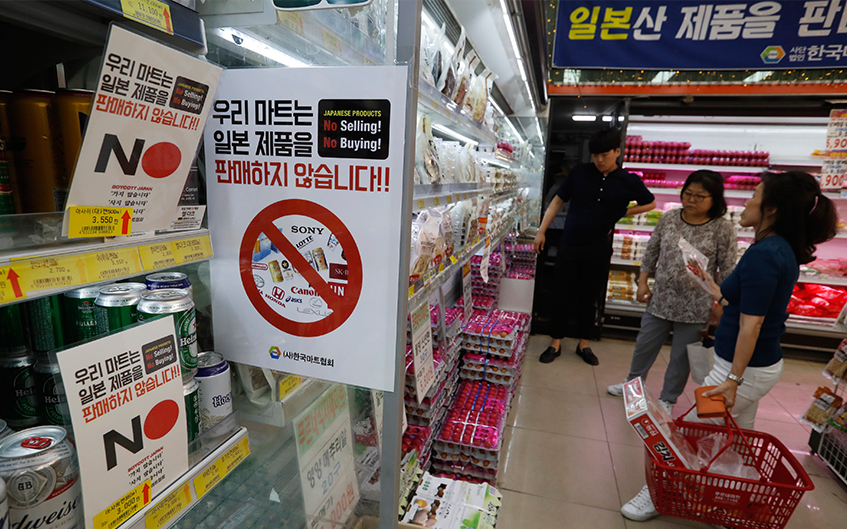
A banner saying “We don’t sell Japanese products” is displayed on July 9 at a supermarket in Seoul, as part of a boycott campaign against Japan’s trade restrictions. © Yonhap News
In an Aug. 11 op-ed, The Washington Post mentioned “deep-seated resentments against Japan that lingered in Korea” behind the trade conflict. It also criticized Japan’s lack of contrition over its past sins, saying, “Japan has continued to fuel the controversy with insincere efforts to demonstrate contrition.”
Even if the latest dispute is resolved, The Post warned, Asia will always be precariously close to another economic or military crisis if Japan fails to make more consistent and far-reaching efforts to achieve reconciliation with Korea.
The unfortunate history shared by the two countries has left wounds and scars too deep to be healed easily.
Bloomberg News, in a July 22 article titled “Abe’s trade war with Korea is hopeless,” said the Japanese leader should never have introduced commercial weapons to a political dispute. “Now Abe needs to compromise. Having started this fight, and having safely survived the elections, he should make the first move,” it said.
Other Articles















